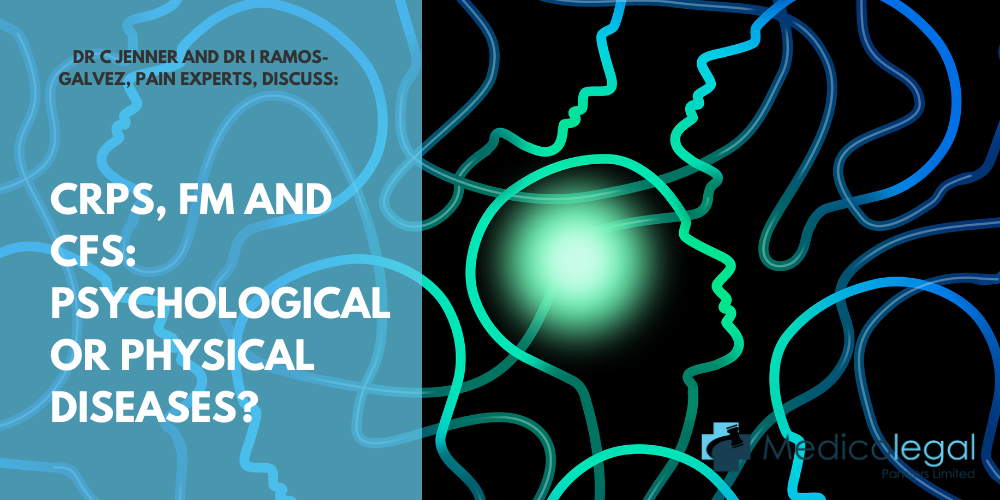Complex Regional Pain Syndrome, Fibromyalgia and Chronic Fatigue Syndrome: Psychological or Physical Diseases?

Complex regional pain syndrome (CRPS) and fibromyalgia (FM) are common chronic pain syndromes. Both are characterised by extreme pain but while CRPS affects only one region of the body, in FM the pain is widespread throughout the body. Chronic fatigue syndrome (CFS), also known as myalgic encephalomyelitis (ME) although there is some dispute as to whether these are two separate conditions, is characterised by medically unexplained fatigue and somatic symptoms. All of these conditions are more common in women than in men (1,2). Currently, there is no diagnostic test available for any of these conditions and diagnosis is based entirely on patients’ self-reported symptoms, as is the assessment of severity and disability.
Under-diagnosis is likely, due to a lack of knowledge about these conditions among health professionals (1,3). While CFS/ME has emerged fairly recently, CRPS and FM were first described decades ago. Despite this, the causes of these conditions are still unclear. In addition, there are no laboratory tests that can confirm diagnosis (1). Furthermore, the symptoms of these conditions overlap with the vegetative symptoms, such as fatigue, lack of energy and impaired concentration, of depressive illness (1,4). Therefore, much of the controversy around diagnosis centres on whether CRPS, FM and CFS/ME reflect a primarily organic disease process, or are more likely to be a manifestation of emotional or psychological issue and are thus somatoform in origin (1). A somatoform disorder is one in which the symptoms presented mimic a physical disease or injury for which there is no plausible identifiable cause. If this is the case, diagnosis serves only to validate a condition that often does not really exist (5). Thus, sufferers of these conditions are often viewed as malingerers (6,7).
However, the medical literature contains little evidence that these conditions are predominately psychological in nature. Combined evidence from 31 studies of CRPS patients found no overall association with psychological symptoms such as depression, anxiety, neuroticism and anger. This was particularly true of the prospective studies included in the analysis. Results from case-control and cross-sectional studies were more equivocal, although the majority did not find any correlation. While many of the studies included were of poor methodological quality, better quality studies were more likely to report no relationship between CRPS and psychological symptoms (8). A more recent review also concluded that there is no evidence for specific personality or psychopathology predictors of CRPS, even though the condition is associated with negative psychological outcomes (9).
A high level of lifetime depression and anxiety is also seen in FM and CFS/ME patients, along with those suffering from many other chronic illnesses, but it is not clear to what extent this represents psychological vulnerability or the consequence of living with a chronic debilitating illness (1,4,7). However, it is notable that a large number of sufferers do not meet the criteria for psychological disorders, which suggests that many patients are actually extremely mentally resilient, particularly in the face of the physical suffering inherent in living with one of these conditions (1,7). Furthermore, while patients experiencing major depression may report pain symptoms, they do not necessarily fulfil the criteria necessary for a diagnosis of a pain condition such as FM (4,7).
A recent study (1), designed to test the extent to which the physical symptoms of CFS/ME reflected the somatisation of unacknowledged emotional distress, found an almost identical incidence of illusory mental health (IMH) in CFS/ME patients with no diagnosed depressive illness and healthy controls. Subjects with IMH do not self-report emotional distress but display it if asked to perform a task such as recalling early memories. This finding does not support the hypothesis that the physical symptoms reported by CFS/ME patients demonstrate a greater tendency by these subjects to somatise emotional distress. Although CFS/ME patients with IMH and no depression did report a higher level of physical symptoms, this does not necessarily imply a causal link between IMH and CFS/ME. Instead, it may reflect a tendency for IMH to be associated with greater physical distress in this subgroup of patients. One limitation of this study was that all of the participants were women, in whom the condition is much more common, and it is not clear to what extent the findings are applicable to men.
There is also little evidence that psychological treatments are sufficient on their own to effect a cure for CRPS, FM and CFS/ME (1,4,6). In particular, the findings of the PACE trial have proved to be very controversial. This study claimed that cognitive behavioural therapy and graded exercise therapy moderately improved outcomes for patients with CFS/ME. However, numerous methodological criticisms of the study have been raised and a re-analysis of the data showed that, after correction for reporting biases, rates of recovery were consistently low and did not differ significantly across treatment groups. Any significant effects were almost entirely confined to self-reported measures of improvement and did not last longer than two years (10). Given all of this evidence, official guidelines now state that these disorders should not be viewed as psychological conditions, but as physical illnesses (1,11).
However, the causes of these conditions remain unclear. In an important breakthrough, Montoya et al (12)measured levels of cytokines in CFS/ME patients and healthy controls. Although only two cytokines showed any significant difference between these two groups, 17 cytokines correlated with the severity of illness in the patient group. Thirteen of these cytokines are proinflammatory and are likely to contribute to the symptoms experienced by sufferers. Therefore, this finding appears to establish a strong immune system component for the disease.
Much of the current research on CRPS causality also centres around involvement of the immune system. One hypothesis is that the condition results from an exaggerated inflammatory response by the body to an injury. This view is strengthened by the fact that the characteristic symptoms of CRPS, such as pain and swelling, are typical of inflammation. Following injury, alterations in the central and peripheral nervous system lead to an increase in inflammation, and responsiveness to pain may also be enhanced (13). Many studies have reported increased levels of inflammatory factors in the blood, blister fluid and cerebrospinal fluid of CRPS patients, with the profiles appearing to differ between acute and chronic cases (14). There is also some evidence of a neurological aspect to the condition, which may be associated with central sensory changes (15). Magnetic resonance imaging has revealed abnormalities in the connectivity between brain structures in CRPS patients, which appear to be different from those seen in other pain conditions (16).
Recent research on the causes of FM suggests that it also involves the central nervous system and represents a condition of central sensitisation. Thus, along with pain amplification, there is reduced pain inhibition throughout the central nervous system. Current research is focussing on understanding the pathogenesis of pain centralisation, which is thought to be caused by altered patterns of connectivity. It is hoped that this research will result in the development of a specific FM pain neurological signature, which may help to develop better treatments for the condition (7).
Despite these advances, CRPS, FM and CFS/ME remain controversial diagnoses. However, the tendency of some practitioners to label these conditions as purely psychological or psychiatric problems is at the very least distressing to patients, who feel they are not being taken seriously, and may actually be harmful (1). Furthermore, even if one assumes that these conditions do not exist as physical diseases, one cannot deny the existence of millions of patients worldwide who present with a combination of symptoms associated with these disorders, and who require treatment for their condition.
About our experts
Medicolegal Partners’ pain experts, Dr Ivan Ramos-Galvez and Dr Chris Jenner, are available for instruction on a range of pain conditions. They are experienced expert witnesses and experts in their fields. They run regular weekly clinics in London and Reading, and also visit Leeds and Birmingham regularly. The upcoming calendar of clinics can be found here. To discuss a case with them, please contact Medicolegal Partners (info@medicolegal-partners.com) or call 020 7118 0650.


References:
- Bram AD, Gottschalk KA, Leeds WM. Chronic fatigue syndrome and the somatic expression of emotional distress: Applying the concept of illusory mental health to address the controversy. J Clin Psychol. 2019 Jan;75(1):116–31.
- Ratti C, Nordio A, Resmini G, Murena L. Post-traumatic complex regional pain syndrome: clinical features and epidemiology. Clin Cases Miner Bone Metab. 2015;12(Suppl 1):11–6.
- Haigh R, McCabe C, Shenker N. Re: Complex Regional Pain Syndrome Medicalises Limb Pain [Internet]. BMJ. 2014 [cited 2018 Jun 18]. Available from: https://www.bmj.com/content/348/bmj.g2631/rr/700657
- Hauser W, Fitzcharles M-A. Facts and myths pertaining to fibromyalgia. Dialogues Clin Neurosci. 2018 Mar;20(1):53–62.
- Bass C. Complex regional pain syndrome medicalises limb pain. BMJ. 2014 Apr;348:g2631.
- Connett RE. Re: Complex Regional Pain Syndrome Medicalises Limb Pain [Internet]. BMJ. 2014 [cited 2018 Jun 18]. Available from: https://www.bmj.com/content/348/bmj.g2631/rr/702609
- Ablin JN. Fibromyalgia 2019: Myths and Realities. Isr Med Assoc J. 2019 Jun;21(6):426–8.
- Beerthuizen A, van ’t Spijker A, Huygen FJPM, Klein J, de Wit R. Is there an association between psychological factors and the Complex Regional Pain Syndrome type 1 (CRPS1) in adults? A systematic review. Pain. 2009 Sep;145(1–2):52–9.
- Lohnberg JA, Altmaier EM. A review of psychosocial factors in complex regional pain syndrome. J Clin Psychol Med Settings. 2013 Jun;20(2):247–54.
- Wilshire CE, Kindlon T, Courtney R, Matthees A, Tuller D, Geraghty K, et al. Rethinking the treatment of chronic fatigue syndrome-a reanalysis and evaluationof findings from a recent major trial of graded exercise and CBT. BMC Psychol. 2018 Mar;6(1):6.
- Goebel A, Barker C, Turner-Stokes L, Al E. Complex regional pain syndrome in adults: UK guidelines for diagnosis, referral and management in primary and secondary care. London: RCP; 2018.
- Montoya JG, Holmes TH, Anderson JN, Maecker HT, Rosenberg-Hasson Y, Valencia IJ, et al. Cytokine signature associated with disease severity in chronic fatigue syndrome patients. Proc Natl Acad Sci U S A. 2017 Aug;114(34):E7150–8.
- Goh EL, Chidambaram S, Ma D. Complex regional pain syndrome: a recent update. Burn trauma. 2017;5:2.
- Parkitny L, McAuley JH, Di Pietro F, Stanton TR, O’Connell NE, Marinus J, et al. Inflammation in complex regional pain syndrome: a systematic review and meta-analysis. Neurology. 2013 Jan;80(1):106–17.
- McCabe CS, Haigh RC, Halligan PW, Blake DR. Referred sensations in patients with complex regional pain syndrome type 1. Rheumatology (Oxford). 2003 Sep;42(9):1067–73.
- Spencer MD, McKechnie S, Munglani R. Re: Complex Regional Pain Syndrome Medicalises Limb Pain [Internet]. BMJ. 2014 [cited 2018 Jun 18]. Available from: https://www.bmj.com/content/348/bmj.g2631/rr/700655
